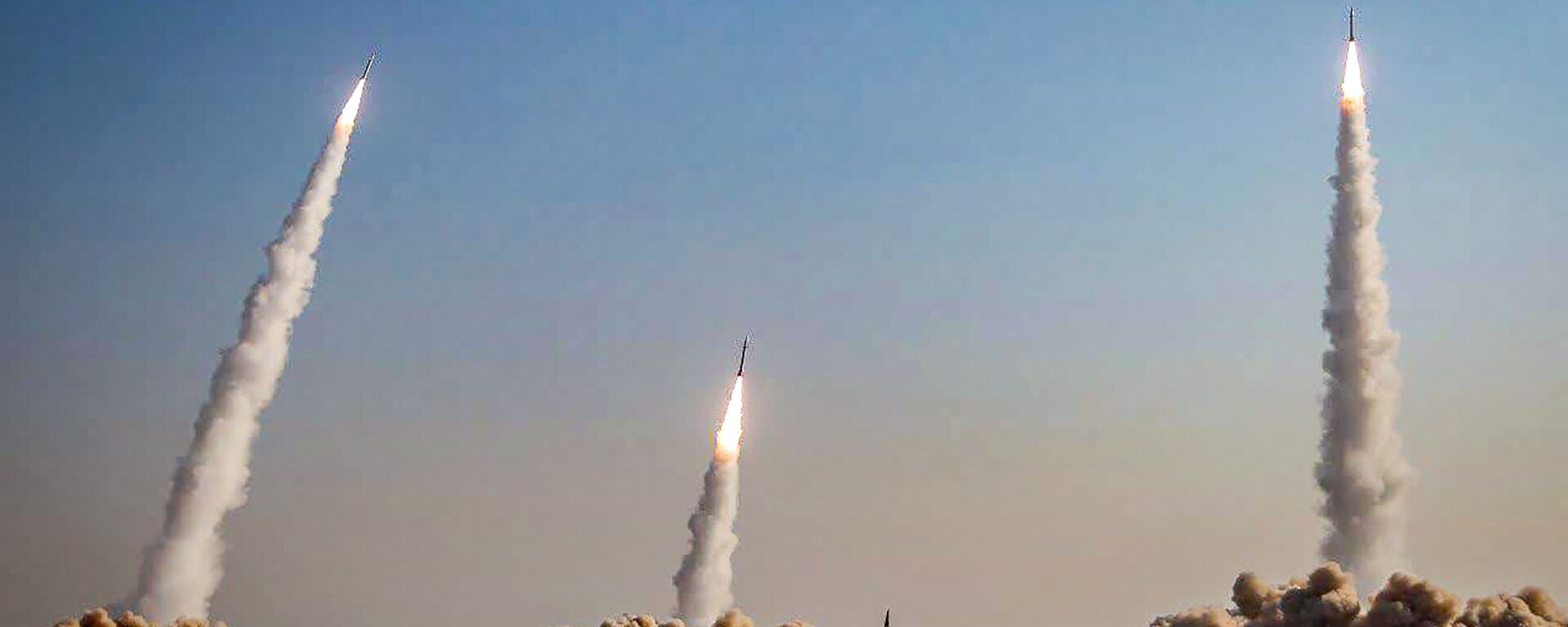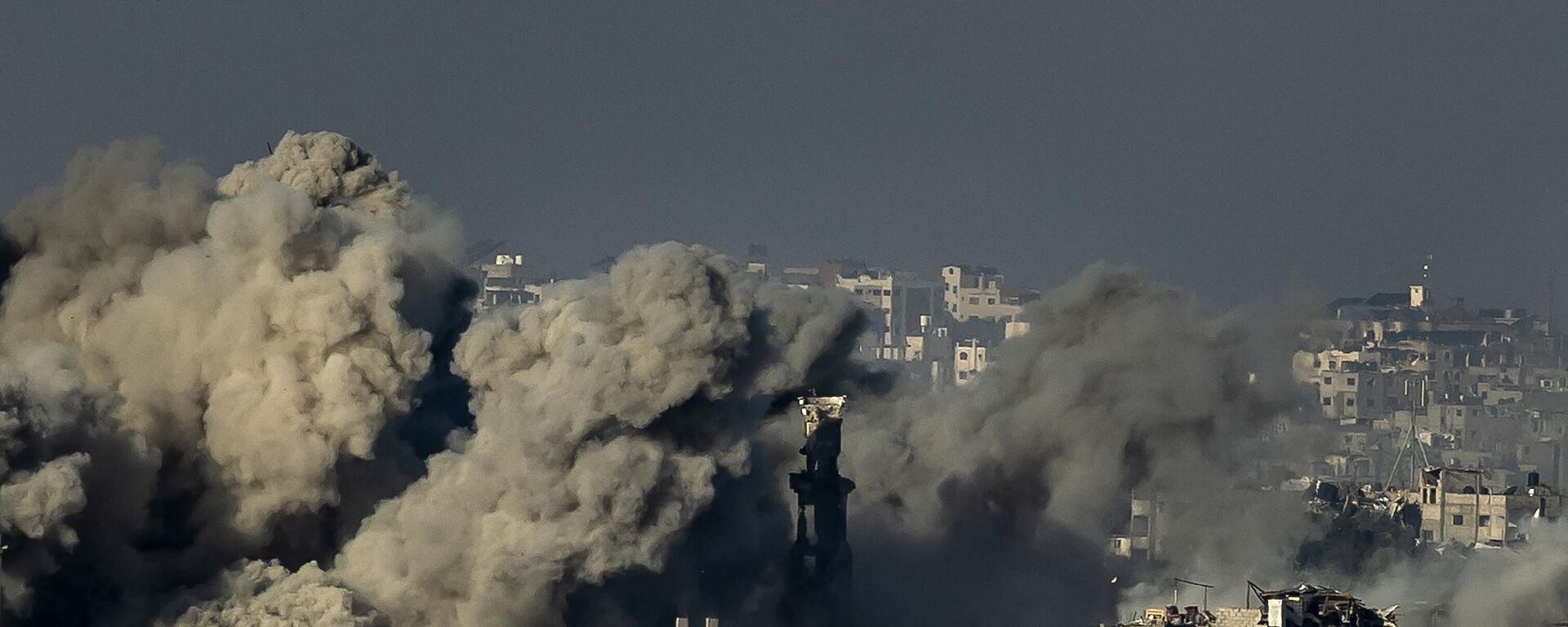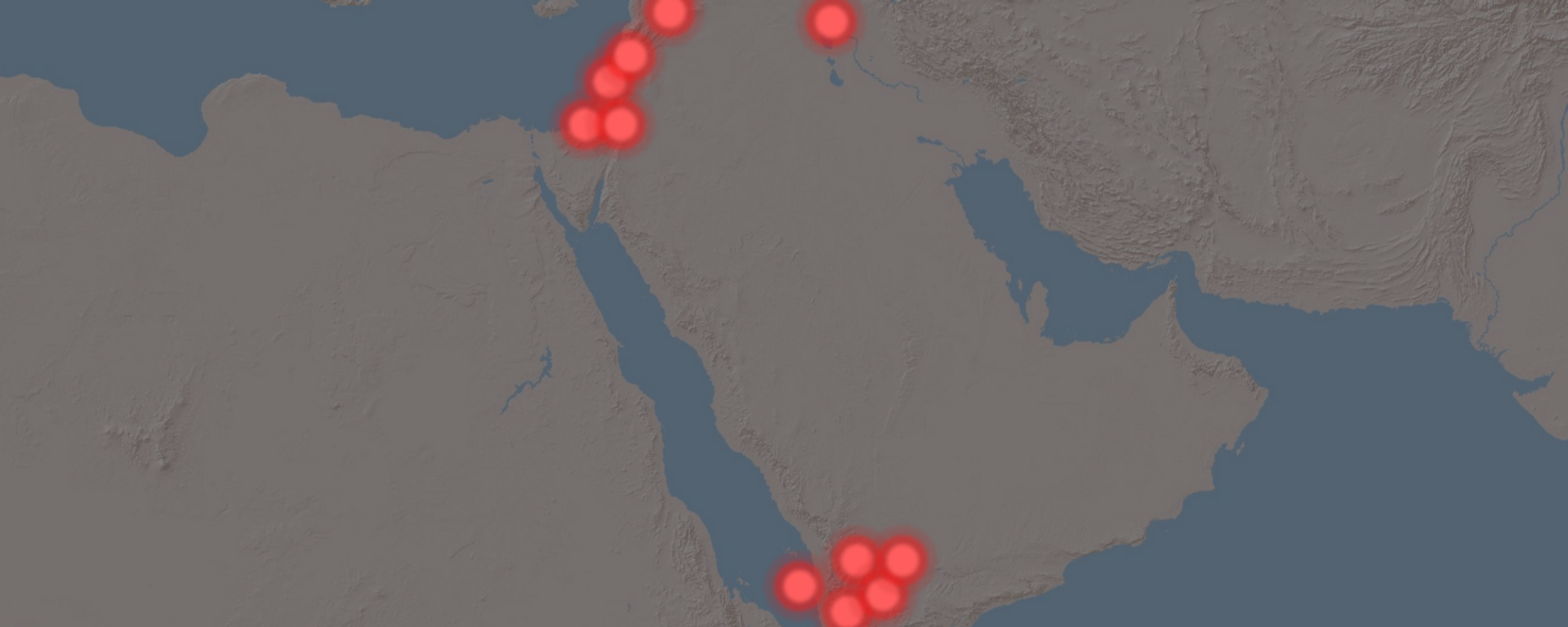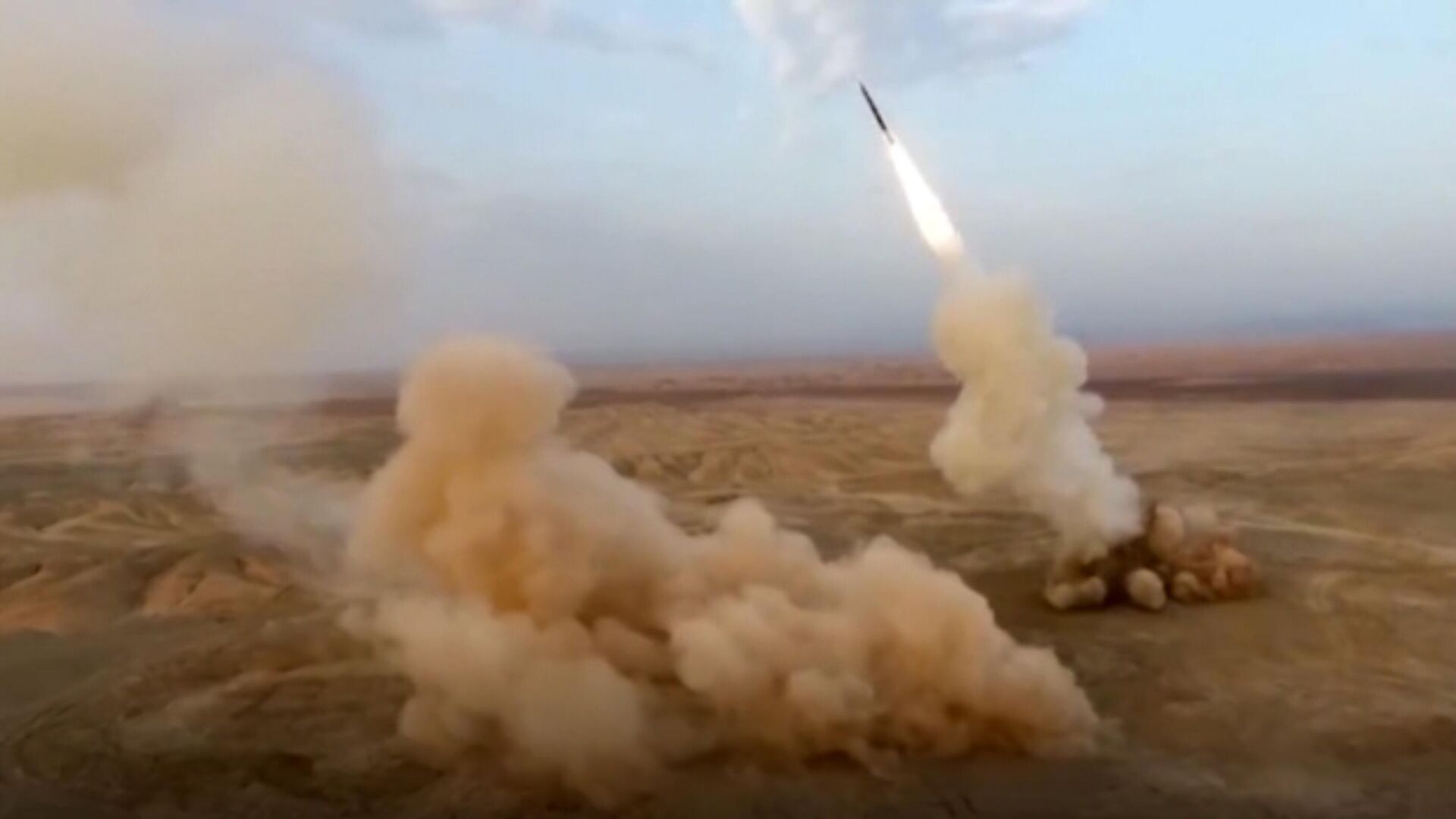https://sputnikglobe.com/20240119/iranian-strike-draws-attention-to-border-with-pakistan-israeli-and-us-role-in-region-1116260331.html
Iranian Strike Draws Attention to Border with Pakistan, Israeli and US Role in Region
Iranian Strike Draws Attention to Border with Pakistan, Israeli and US Role in Region
Sputnik International
Tensions have flared between Iran and Pakistan in recent days, but one international affairs expert is pointing to the destabilizing role of Western powers in the Middle East.
2024-01-19T02:47+0000
2024-01-19T02:47+0000
2024-01-25T18:16+0000
analysis
palestine-israel conflict
israel-gaza conflict
humanitarian crisis
israel defense forces (idf)
israel
iran
pakistan
benjamin netanyahu
islamic revolutionary guard corps (irgc)
https://cdn1.img.sputnikglobe.com/img/07e8/01/13/1116260948_41:0:2880:1597_1920x0_80_0_0_0a2efe3deb6b7ad0e3cd9d933d947e66.jpg
Iran drew headlines Tuesday when it launched a missile and drone attack on two alleged terrorist bases in Pakistan’s southwestern Balochistan province. It was the first time Iran attacked targets on Pakistani soil, which Iran’s foreign minister claimed was necessary to weaken the dangerous Jaish ul-Adl (lit. "Army of Justice") terrorist group.Pakistan responded angrily to the development, withdrawing its ambassador in Tehran in protest of the claimed “blatant breach of Pakistan’s sovereignty.”Sputnik’s Fault Lines program spoke with Professor Mohammad Marandi of the University of Tehran to place the events in context and determine whether they represent a harbinger of antagonistic relations with Islamabad. Hosts Jamarl Thomas and Melik Abdul also examined the role of Israel in regional affairs amidst its assault on Gaza and examined whether China could play a part in mediating between Pakistan and Iran.‘An Imminent Threat’Marandi drew attention to Jaish al-Adl, an armed group of Sunni Islamist separatists that operates along and across Iran’s border with Pakistan in the southeastern region of the country. Jaish al-Adl claims to represent the interests of the minority Balochi ethnic group and opposes the Iranian government. They have taken credit for a number of attacks against Iranian political and military officials.“They carried out a series of attacks in Iran including, a few weeks ago, an attack which killed 11 border guards,” Marandi noted. “They were about to strike Iran again. They gathered in two bases and they were about to move towards the border.”Marandi claimed that Tehran didn’t make the decision lightly but was forced to act amidst a difficult situation on the Pakistani border where people on both sides often cross freely. He claimed the problem is compounded by poverty in Pakistan with many people crossing into Iran as “economic refugees.”He claimed the incident, while regrettable, wasn’t a sign of hostility towards Pakistan’s government, saying, “the relationship between Iran and Pakistan is quite good. This is an incident that will not undermine the relationship.” Marandi also noted upcoming elections in Iran, stressing that the Ebrahim Raisi administration had a political incentive to avoid appearing weak.The professor noted Tehran had also carried out attacks on alleged terrorists recently in Syria and Iraq, claiming a common thread of Israeli and Western support for various anti-Iran groups.The Hand of IsraelIsrael has drawn outrage throughout the Middle East for its military campaign in the besieged Gaza Strip, which has killed almost 25,000 Palestinians. Tel Aviv’s posture has drawn condemnation from Turkey, Egypt, and even Saudi Arabia which was reportedly set to seek normalization with Israel before the latest outbreak of hostilities. Recently fear has spread that Gazans could suffer mass starvation as Israel enforces a tight blockade on the territory.Israeli Prime Minister Benjamin Netanyahu’s military difficulties in Gaza as well as his perilous political position have generated speculation he may seek a broader regional war.“All these different groups are right now being mobilized by the Israelis,” Marandi alleged. “We have to remember that the Israelis have a long lasting relationship with ISIS* because ISIS during the Syrian Dirty War had bases alongside the Golan Heights.”Israel shared an open opposition to the Bashar al-Assad regime in Syria with Islamist militants in the country, many of whom have ties to ISIS and Wahabbist ideology. Speculation emerged that Israel was backing the Syrian rebels, with the Israel Defense Forces chief finally admitting in 2019 that the country had supplied them with weapons.Support for Islamist radicals in the region has long been a tactic of the United States as well, with the country’s backing of the Mujahideen against Soviet forces in Afghanistan providing perhaps the most famous example. The flourishing of religious extremism in the country would empower terrorist groups like Al-Qaeda**, who organized the September 11, 2001, terrorist attacks in the United States.Marandi made similar accusations regarding Jaish al-Adl, claiming they are “affiliated to Western intelligence agencies.”The professor denounced the US’ role in the region, and in particular their strong support for Israel which has seen the Biden administration consistently obstruct efforts to hold Israel to account at the United Nations.“Stop the war in Gaza and allow peace to be restored in our region.”A Role for China?China has increasingly made an effort to mediate between countries in the Middle East, most recently in its brokering of a deal between Saudi Arabia and Iran. The United States is increasingly seen as a dishonest broker by many in the region, while China is viewed as a more neutral party. The decline in America’s perception has seen Middle Eastern countries strengthen ties with China, as well as Russia.Host Melik Abdul asked about the possibility for China to play a helpful role in Iran-Pakistan relations, noting their recent statement urging both countries to exercise restraint.“China can play a constructive role,” said Marandi. “If, for example, China can help Pakistan build up infrastructure and border security, that would go a long way in stopping these sort of attacks.”China recently released a joint statement with the Arab League calling for a ceasefire in Gaza. Both parties denounced recent US and UK-backed attacks in Yemen and insisted a resolution of the Palestine-Israel conflict was the only way to ensure peace in the region. China also vowed to increase economic integration with the Middle East which has formed a key part of its global Belt and Road initiative.The rise of a multipolar world seems destined to strengthen countries across the globe, economically as well as politically. In such a world, observers hope it will be harder for any one nation to dominate another, making it easier for countries like Iran and Pakistan to resolve differences peacefully.* ISIS (also known as Daesh/ISIL/IS/Islamic State) is a terrorist group banned in Russia and many other countries.** Al-Qaeda is a terrorist organization banned in Russia and other states.
https://sputnikglobe.com/20240117/irans-strikes-into-pakistan-sent-strong-message-to-us-israel-and-their-terror-proxies-1116226148.html
https://sputnikglobe.com/20231121/ex-cia-analyst-us-responsible-for-gaza-genocide-by-empowering-netanyahu--1115100230.html
https://sputnikglobe.com/20240116/oil-power-and-conflict-strategic-hotspots-across-the-middle-east-1116202756.html
israel
iran
pakistan
china
Sputnik International
feedback@sputniknews.com
+74956456601
MIA „Rossiya Segodnya“
2024
John Miles
https://cdn1.img.sputnikglobe.com/img/07e8/01/19/1116388787_0:0:1316:1316_100x100_80_0_0_77e70d36afd983012b1c5d38ddb84156.jpg
John Miles
https://cdn1.img.sputnikglobe.com/img/07e8/01/19/1116388787_0:0:1316:1316_100x100_80_0_0_77e70d36afd983012b1c5d38ddb84156.jpg
News
en_EN
Sputnik International
feedback@sputniknews.com
+74956456601
MIA „Rossiya Segodnya“
Sputnik International
feedback@sputniknews.com
+74956456601
MIA „Rossiya Segodnya“
John Miles
https://cdn1.img.sputnikglobe.com/img/07e8/01/19/1116388787_0:0:1316:1316_100x100_80_0_0_77e70d36afd983012b1c5d38ddb84156.jpg
us, iran, pakistan, western powers, western influence, western interference, wetern dominance, us hegemony, iranian strike, pakistan strikes iran, iran strikes pakistan
us, iran, pakistan, western powers, western influence, western interference, wetern dominance, us hegemony, iranian strike, pakistan strikes iran, iran strikes pakistan
Iranian Strike Draws Attention to Border with Pakistan, Israeli and US Role in Region
02:47 GMT 19.01.2024 (Updated: 18:16 GMT 25.01.2024) Tensions have flared between Iran and Pakistan in recent days, but one international affairs expert is pointing to the destabilizing role of Western powers in the Middle East.
Iran drew headlines Tuesday when it
launched a missile and drone attack on two alleged terrorist bases in Pakistan’s southwestern Balochistan province. It was the first time Iran attacked targets on Pakistani soil, which Iran’s foreign minister
claimed was necessary to weaken the dangerous Jaish ul-Adl (lit. "Army of Justice") terrorist group.
Pakistan responded angrily to the development,
withdrawing its ambassador in Tehran in protest of the claimed “blatant breach of Pakistan’s sovereignty.”
Sputnik’s Fault Lines program
spoke with Professor Mohammad Marandi of the University of Tehran to place the events in context and determine whether they represent a harbinger of antagonistic relations with Islamabad. Hosts Jamarl Thomas and Melik Abdul also examined the role of Israel in regional affairs amidst its assault on Gaza and examined whether China could play a part in mediating between Pakistan and Iran.
Marandi drew attention to Jaish al-Adl, an armed group of Sunni Islamist separatists that operates along and across Iran’s border with Pakistan in the southeastern region of the country. Jaish al-Adl claims to represent the interests of the minority Balochi ethnic group and opposes the Iranian government. They have taken credit for a number of attacks against Iranian political and military officials.
“They carried out a series of attacks in Iran including, a few weeks ago, an attack which killed 11 border guards,” Marandi noted. “They were about to strike Iran again. They gathered in two bases and they were about to move towards the border.”
“The Iranians saw that this was an imminent threat, and they had a small window of opportunity,” claimed the professor of English literature and Orientalism. “They calculated that if they wait, it'll be another tragedy. they felt they had to strike, even though they knew that the Pakistani government would be very unhappy, understandably.”

17 January 2024, 13:21 GMT
Marandi claimed that Tehran didn’t make the decision lightly but was forced to act amidst a difficult situation on the Pakistani border where people on both sides often cross freely. He claimed the problem is compounded by poverty in Pakistan with many people crossing into Iran as “economic refugees.”
“Because of the economic situation in Pakistan, first of all, Pakistan's army is mostly focused on India,” the expert said. “So they don't have many resources on this side of the country… it's very difficult when the Pakistanis are not controlling their side of the border.”
He claimed the incident, while regrettable, wasn’t a sign of hostility towards Pakistan’s government, saying, “the relationship between Iran and Pakistan is quite good. This is an incident that will not undermine the relationship.” Marandi also noted upcoming elections in Iran, stressing that the Ebrahim Raisi administration had a political incentive to avoid appearing weak.
The professor noted Tehran had also carried out attacks on alleged terrorists recently in Syria and Iraq, claiming a common thread of Israeli and Western support for various anti-Iran groups.
Israel has drawn outrage throughout the Middle East for its military campaign in the besieged Gaza Strip, which has
killed almost 25,000 Palestinians. Tel Aviv’s posture has drawn condemnation from Turkey, Egypt, and even Saudi Arabia which was reportedly set to seek normalization with Israel before the latest outbreak of hostilities. Recently fear has
spread that Gazans could suffer mass starvation as Israel enforces a tight blockade on the territory.
Israeli Prime Minister Benjamin Netanyahu’s military difficulties in Gaza as well as his perilous political position have
generated speculation he may seek a broader regional war.
“The Israelis, since they've been losing the ground war in Gaza and things have been going very poorly for them among the… international community, they've been globalizing their resources against Iran to put pressure on Iran,” said Marandi. “We've seen a series of air attacks, both in Kerman, as I mentioned, but also others.”
“All these different groups are right now being mobilized by the Israelis,” Marandi alleged. “We have to remember that the Israelis have a long lasting relationship with ISIS* because ISIS during the Syrian Dirty War had bases alongside the Golan Heights.”
Israel shared an open opposition to the Bashar al-Assad regime in Syria with Islamist militants in the country, many of whom have ties to ISIS and Wahabbist ideology. Speculation emerged that Israel was backing the Syrian rebels, with the Israel Defense Forces chief finally
admitting in 2019 that the country had supplied them with weapons.
Support for Islamist radicals in the region has long been a tactic of the United States as well, with the country’s backing of the Mujahideen against Soviet forces in Afghanistan providing perhaps the most famous example. The flourishing of religious extremism in the country would empower terrorist groups like Al-Qaeda**, who organized the September 11, 2001, terrorist attacks in the United States.
Marandi made similar accusations regarding Jaish al-Adl, claiming they are “affiliated to Western intelligence agencies.”
The professor denounced the US’ role in the region, and in particular their strong support for Israel which has seen the Biden administration
consistently obstruct efforts to hold Israel to account at the United Nations.
“Mr. Biden should not tie their destiny to the fate of Netanyahu,” said the expert. “The full scale cooperation of Biden in the White House with folks like Netanyahu in Israel is the root of insecurity in the region. President Biden should immediately abandon his full support for this genocide of the Palestinians and the killing of more than 13,500 Palestinian children.”
“Stop the war in Gaza and allow peace to be restored in our region.”

21 November 2023, 19:19 GMT
China has increasingly made an effort to mediate between countries in the Middle East, most recently in its brokering of a deal between Saudi Arabia and Iran. The United States is increasingly seen as a dishonest broker by many in the region, while China is viewed as a more neutral party. The decline in America’s perception has seen Middle Eastern countries
strengthen ties with China, as well as Russia.
Host Melik Abdul asked about the possibility for China to play a helpful role in Iran-Pakistan relations,
noting their recent statement urging both countries to exercise restraint.
“China can play a constructive role,” said Marandi. “If, for example, China can help Pakistan build up infrastructure and border security, that would go a long way in stopping these sort of attacks.”
“Pakistan, as we speak, doesn't have those resources,” the expert added. “[On the] Iranian side, they're going to reinforce the border further after this, and Pakistan doesn't have those resources. So if China did come in and assist Pakistan in creating border security infrastructure that would be very helpful.”

16 January 2024, 18:21 GMT
China recently
released a joint statement with the Arab League calling for a ceasefire in Gaza. Both parties denounced recent US and UK-backed attacks in Yemen and insisted a resolution of the Palestine-Israel conflict was the only way to ensure peace in the region. China also vowed to increase economic integration with the Middle East which has formed a key part of its global Belt and Road initiative.
The rise of a
multipolar world seems destined to strengthen countries across the globe, economically as well as politically. In such a world, observers hope it will be harder for any one nation to dominate another, making it easier for countries like Iran and Pakistan to resolve differences peacefully.
* ISIS (also known as Daesh/ISIL/IS/Islamic State) is a terrorist group banned in Russia and many other countries.
** Al-Qaeda is a terrorist organization banned in Russia and other states.






